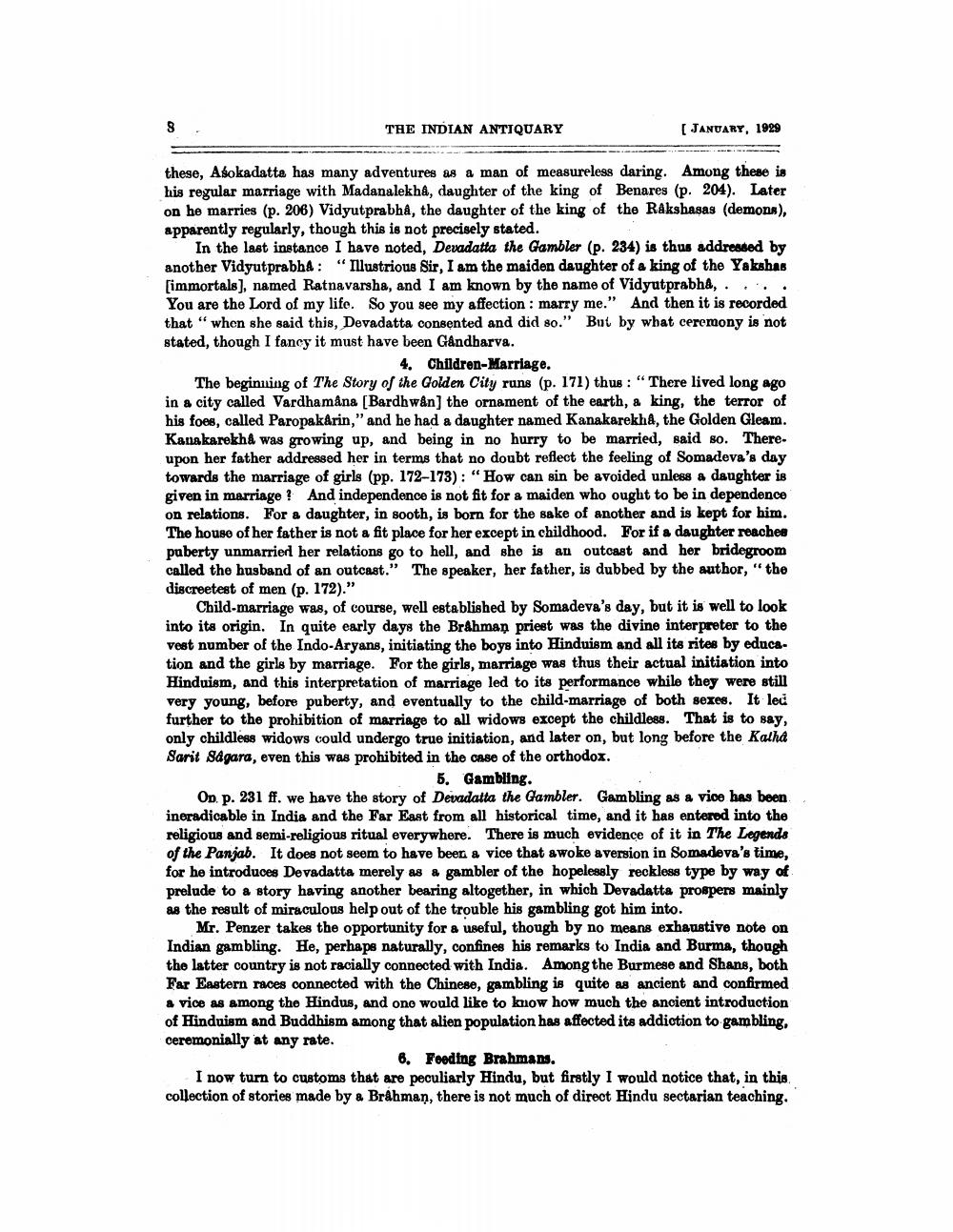________________
8
.
THE INDIAN ANTIQUARY
( JANUARY, 1929
these, Asokadatta has many adventures as a man of measureless daring. Among these is his regular marriage with Madanalekha, daughter of the king of Benares (p. 204). Later on he marries (p. 206) Vidyut prabha, the daughter of the king of the Rakshasas (demons), apparently regularly, though this is not precisely stated.
In the last instance I have noted, Devadatta the Gambler (p. 234) is thus addressed by another Vidyutprabha: "Illustrious Sir, I am the maiden daughter of a king of the Yakshas [immortals), named Ratnavarsha, and I am known by the name of Vidyutprabha, .... You are the Lord of my life. So you see my affection : marry me." And then it is recorded that " when she said this, Devadatta consented and did so." But by what ceremony is not stated, though I fancy it must have been Gandharva.
4. Children-Marriage. The beginning of The Story of the Golden City runs (p. 171) thus : "There lived long ago in a city called Vardhamana (Bardhwân) the ornament of the earth, a king, the terror of his foes, called Paropakarin," and he had a daughter named Kanakarekha, the Golden Gleam. Kanakarekha was growing up, and being in no hurry to be married, said so. Thereupon her father addressed her in terms that no doubt reflect the feeling of Somadeva's day towards the marriage of girls (pp. 172-173): "How can sin be avoided unless a daughter is given in marriage? And independence is not fit for a maiden who ought to be in dependence on relations. For a daughter, in sooth, is born for the sake of another and is kept for him. The house of her father is not a fit place for her except in childhood. For if a daughter reaches puberty unmarried her relations go to hell, and she is an outcast and her bridegroom called the husband of an outcast." The speaker, her father, is dubbed by the author, "the discreetest of men (p. 172)."
Child marriage was, of course, well established by Somadeva's day, but it is well to look into its origin. In quite early days the Br&hman priest was the divine interpreter to the vest number of the Indo-Aryans, initiating the boys into Hinduism and all its rites by educa. tion and the girls by marriage. For the girls, marriage was thus their actual initiation into Hinduism, and this interpretation of marriage led to its performance while they were still very young, before puberty, and eventually to the child marriage of both sexes. It led further to the prohibition of marriage to all widows except the childless. That is to say, only childless widows could undergo true initiation, and later on, but long before the Katha Sarit Sagara, even this was prohibited in the case of the orthodox.
5. Gambling. Op. p. 231 ff. we have the story of Devadatta the Gambler. Gambling as a vice has been ineradicable in India and the Far East from all historical time, and it has entered into the religious and semi-religious ritual everywhere. There is much evidence of it in The Legends of the Panjab. It does not seem to have been a vice that awoke a version in Somadeva's time, for he introduces Devadatta merely as a gambler of the hopelessly reckless type by way of prelude to a story having another bearing altogether, in which Devadatta prospers mainly as the result of miraculous help out of the trouble his gambling got him into.
Mr. Penzer takes the opportunity for a useful, though by no means exhaustive note on Indian gambling. He, perhaps naturally, confines his remarks to India and Burma, though the latter country is not racially connected with India. Among the Burmese and Shans, both Far Eastern races connected with the Chinese, gambling is quite as ancient and confirmed a vice as among the Hindus, and one would like to know how much the ancient introduction of Hinduism and Buddhism among that alien population has affected its addiction to gambling. ceremonially at any rate.
6. Feeding Brahmans. I now turn to customs that are peculiarly Hindu, but firstly I would notice that, in this collection of stories made by a Brahman, there is not much of direct Hindu sectarian teaching,




